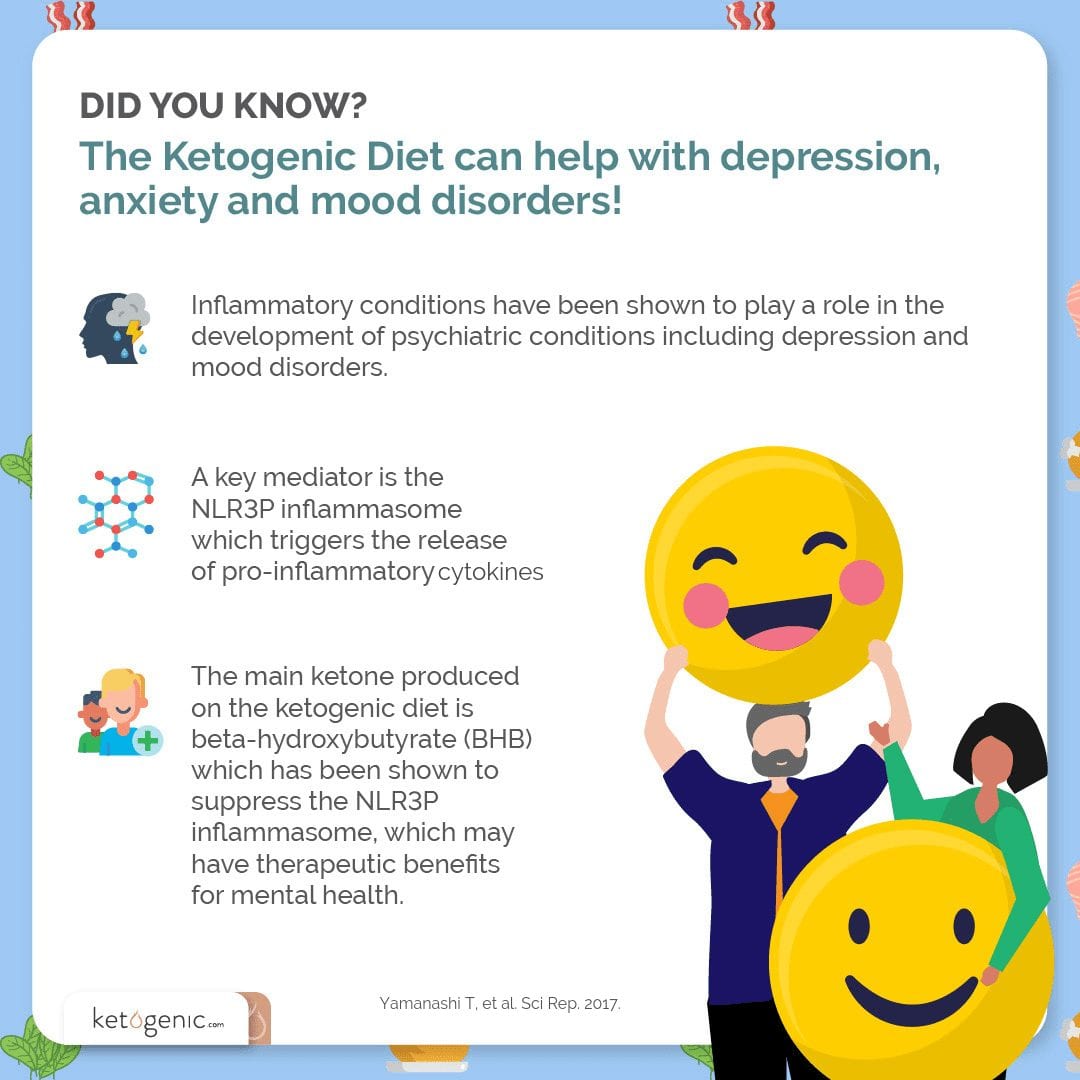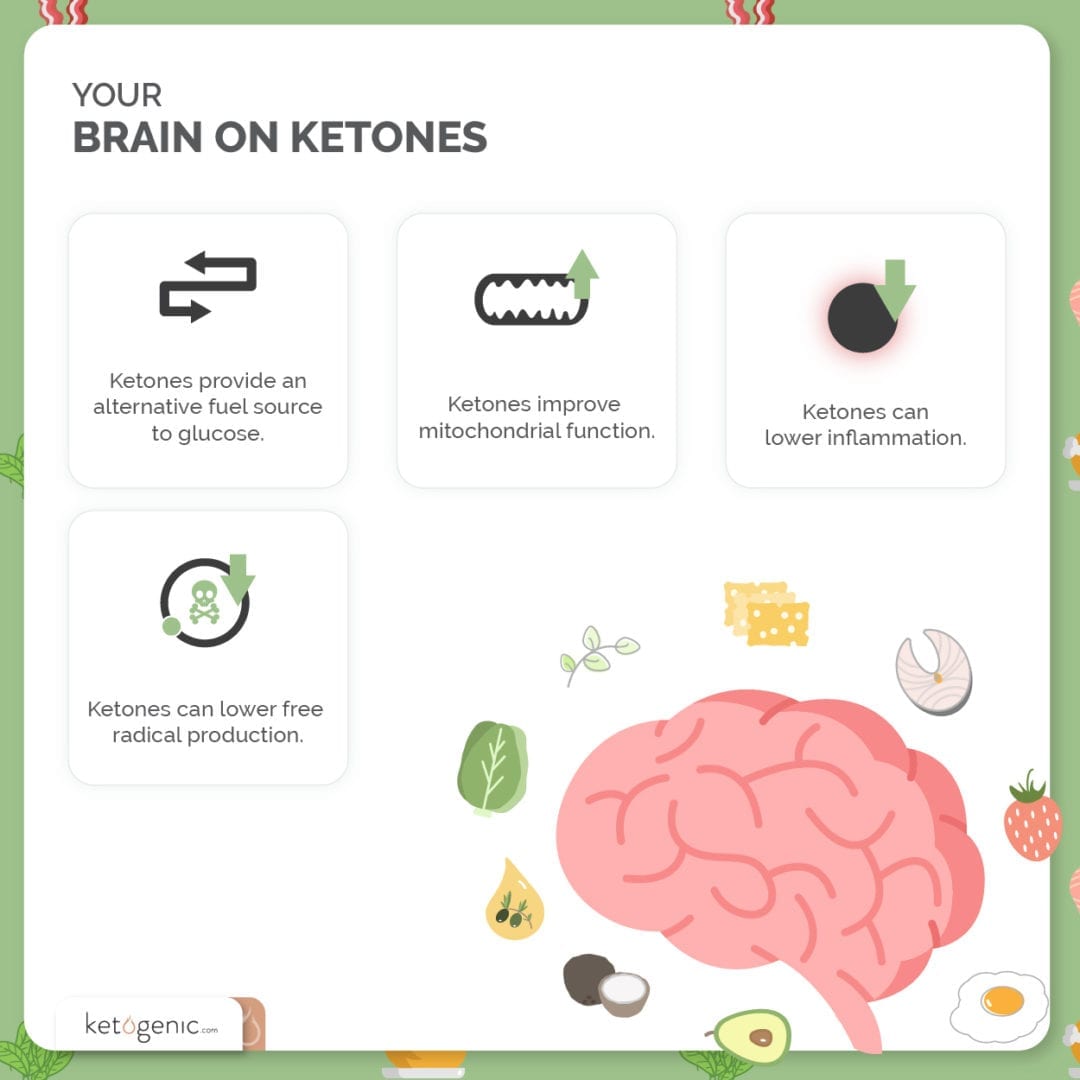
Going keto can influence various bodily systems and processes as well as your mood and behavior. The ketogenic diet, the healthy fats, and the ketones are beneficial for your brain, and research abounds highlights the many ways going keto can positively influence your cognitive functioning, behavior, and mood.
What Does the Research Show?
Starting with the research on epilepsy many decades ago, the ketogenic diet continues to show benefits for brain health and general wellness. Higher blood ketones can lead to fewer epileptic seizures in patients, demonstrating how keto can alter brain chemistry [1] [2] [3] [4].
Mood disorders like depression are complex, but researchers have explored the ketogenic diet as a treatment for depression with promising results. For example, animal studies show going keto can change brain volume, increase the thickness of blood vessels in the brain, and improve markers of depression, such as low physical activity. Other studies show ketones can protect brain cells from injury [5] [6] [7] [8].
The Blood Sugar Rollercoaster
The rise and consequent crash of the well-known blood sugar rollercoaster can contribute to depression and anxiety. High-carb foods cause rapid blood sugar spikes, and what goes up must come down, just as fast. Energy crashes can affect your mood, and your body triggers a stress response that leads to depression and anxiety.
One study revealed diabetic patients with fluctuating blood sugar levels had higher rates of depression than those with more stable blood sugar levels. Since going keto eliminates the carbs that cause this blood sugar rollercoaster, this could be one way it helps with depression and anxiety.
Another study showed middle-aged people who ate a diet rich in whole foods like fish and vegetables were less likely to be diagnosed with depression than people who ate more processed foods, such as refined grains and sugary desserts [9] [10].
Fuel for Your Brain
Ketones are metabolized faster than glucose and provide an immediate and longer-lasting energy source for your brain. With plenty of advantageous ketones for fuel, your brain won’t panic and think you’re running out of food. Ketones make an excellent, powerful fuel source for your brain. The healthy fats you consume on keto feed your brain and keep your mood stable.
Your brain is made up of around 60% fat, and it needs good fats to function. A wealth of studies reveal that omega-3 fatty acids found in foods like grass-fed beef and wild fish might reduce depression [11] [12].
In one study, EPA and DHA (two types of omega-3 fatty acids) assisted serotonin secretion. Serotonin is the neurotransmitter (chemical messenger) that helps regulate your mood. Low levels of serotonin are linked to depression [13] [14].
Lowering Inflammation
Research unveils a link between depression and inflammation. Depressed people tend to have higher levels of proinflammatory cytokines — molecules released by your body in response to inflammation. The ketogenic diet can lower inflammation, boost antioxidant production, and more [15] [16] [17].
Quality Foods and the Microbiome
If you consume higher-quality foods on the ketogenic diet, you’re also avoiding inflammatory, processed, carb-heavy foods like cereal and pasta that might be damaging to the digestive system. Many experts and researchers highlight the gut-brain connection and how the health of your digestive system influences your mood and behavior.
The bacteria in your gut (microbiome) communicate with your brain in ways that scientists are only beginning to understand. Some research shows the ketogenic diet can improve and alter the gut microbiome [18]. You can also add probiotic-rich fermented foods to your keto diet!
Promoting Neurogenesis
Going keto can also increase your rate of neurogenesis – how often you make new brain cells. A low rate of neurogenesis is associated with mood problems like depression. On the other hand, a higher rate can boost emotional resilience. A high-sugar diet spikes insulin levels in your blood and slow your rate of neurogenesis [19].
Can the Ketogenic Diet Have a Negative Impact on Your Mood?
If you’re not eating a nutrient-dense, healthy ketogenic diet, you might not be getting enough beneficial antioxidants, minerals, vitamins, and enzymes that stabilize your mood. You can still be keto and overeat keto-friendly junk food products that are inflammatory and contain chemical additives and artificial ingredients. Without a diverse, balanced keto diet, you might have a gut imbalance and a lack of diversity in your microbiome, which could lead to depression [20].
You might also be low in electrolytes. When you first go keto, your kidneys excrete more water and your body transitions from burning glucose to ketones for energy. With this water loss comes the loss of valuable electrolytes, such as potassium and magnesium. Low levels of electrolytes are associated with depression [21].
This is easily solved by eating a balanced keto diet and supplementing electrolytes. Try adding an electrolyte or mineral packet to your water or sprinkling more Celtic sea salt or Arctic salt in your diet. If you’re feeling a little down on keto, you could try:
- Cyclic ketosis
- Mood-boosting supplements like zinc or glutathione
- Eating more anti-inflammatory, quality keto foods
- Finding a support group or accountability partner
- Getting more sleep
- Getting appropriate regular exercise
Most people find that following the ketogenic diet benefits mood, behavior, and so much more.
Has the Ketogenic Diet Influenced Your Mood or Behavior?
Share your experience on the ketogenic diet and how changing your way of eating affected your brain health, cognition, mood, and behavior.
References
Epilepsy Society (UK). The Ketogenic Diet.
Hartman, A. L., Gasior, M., Vining, E. P. G., & Rogawski, M. A. (2007). The neuropharmacology of the ketogenic diet. Pediatric Neurology, 36(5), 281-292.
Bough, K. J., & Rho, J. M. (2007). Anticonvulsant mechanisms of the ketogenic diet.Epilepsia, 48(1), 43-58.
Bostock, E. C. S., Kirkby, K. C., & Taylor, B. V. M. (2017). The current status of the ketogenic diet in psychiatry. Front Psychiatry,
Murphy, P., Likhodii, S., Nylen, K., & Burnham, W. M. (2004). The antidepressant properties of the ketogenic diet. Biological Psychiatry, 56(12), 981-983.
Sussman, D., Germann, J., & Henkelman, M. (2014). Gestational ketogenic diet programs brain structure and susceptibility to depression & anxiety in the adult mouse offspring. Brain and Behavior,
Puchowicz, M. A., Xu, K., Sun, X., Ivy, A., Emancipator, D., & LaManna, J. C. (2007). Diet-induced ketosis increases capillary density without altered blood flow in rat brain. American Journal of Physiology Endocrinology & Metabolism, 292(6), E1607-E1615.
Maalouf, M., Rho, J. M., & Mattson, M. P. (2009). The neuroprotective properties of calorie restriction, the ketogenic diet, and ketone bodies. Brain Research Reviews, 59(2), 293-315.
Akbaraly, T. N., Brunner, E. J., Ferrie, J. E., & Marmot, M. G. (2009). Dietary pattern and depressive symptoms in middle age. The British Journal of Psychiatry, 195(5), 408-413.
Ravona-Springer, R., Heymann, A., Schmeidler, J., Moshier, E., Guerrero-Berroa, E., Soleimani, L., Sano, M., Leroith, D., Preiss, R., Tzukran, R., Silverman, J. M., & Beeri, M. S. (2017). Hemoglobin A1c variability predicts symptoms of depression in elderly individuals with type 2 diabetes. Diabetes Care,
Chang, C-Y., Ke, D-S., & Chen, J-Y. (2009). Essential fatty acids and human brain.Acta Neurologica Taiwanica, 18(4), 231-241.
Logan, A. C. (2004).Omega-3 fatty acids and major depression: A primer for the mental health professional.Lipids in Health and Disease,
Patrick, R. P., & Ames, B. N. (2015). Vitamin D and the omega-3 fatty acids control serotonin synthesis and action, part 2: Relevance for ADHD, bipolar disorder, schizophrenia, and impulsive behavior.FASEB Journal, 29(6), 2207-2222.
Walderhaug, E., Magnusson, A., Neumeister, A., Lunde, H., Refsum, H., & Landro, N. I. (2007). Interactive effects of sex and 5-HTTLPR on mood and impulsivity during tryptophan depletion in healthy people. Biological Psychiatry, 62(6), P593-P599.
Ruskin, D. N., Kawamura, Jr, M., & Masino, S. A. (2009). Reduced pain and inflammation in juvenile and adult rats fed a ketogenic diet.PLOS One, 4(12), e8349.
Dupuis, N., Curatolo, N., Benoist, J-F., & Auvin, S. (2015). Ketogenic diet exhibits anti-inflammatory properties. Epilepsia,
Zunszain, P. A., Helpful, N., & Pariante, C. M. (2012). Inflammation and depression. Behavioral Neurobiology of Depression and Its Treatment, 135-151.
Ma, D., Wang, A. C., Parikh, I., Green, S. J., Hoffman, J. D., Chlipala, G., Murphy, M. P., Sokola, B. S., Hartz, A. M. S., & Lin, A-L. (2018). Ketogenic diet enhances neurovascular function with altered gut microbiome in young healthy mice. Scientific Reports, 8(6670),
Molteni, R., Barnard, R. J., Ying, Z., Roberts, C. K., & Gomez-Pinilla, F. (2002). A high-fat, refined sugar diet reduces hippocampal brain-derived neurotrophic factor, neuronal plasticity, and learning. Neuroscience, 112(4), 803-814.
Evrensel, A., & Ceylan, M. E. (2015). The gut-brain axis: The missing link in depression. Clinical Psychopharmacology and Neuroscience, 13(3), 239-244.
Kamei, K., Tabata, O., Muneoka, K., Muraoka, S-I., Tomiyoshi, R., & Takigawa, M. (2002). Electrolytes in erythrocytes of patients with depressive disorders.Psychiatry and Clinical Neurosciences,









